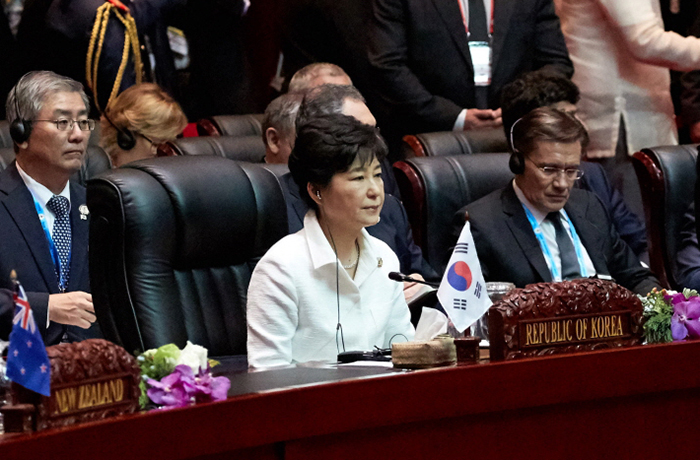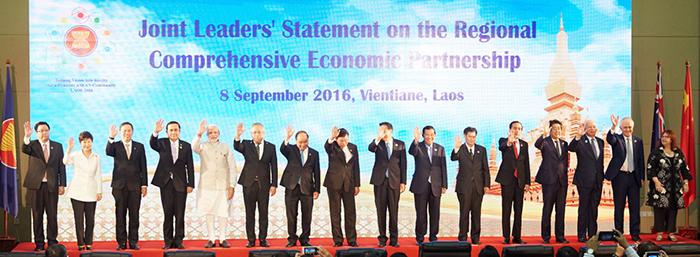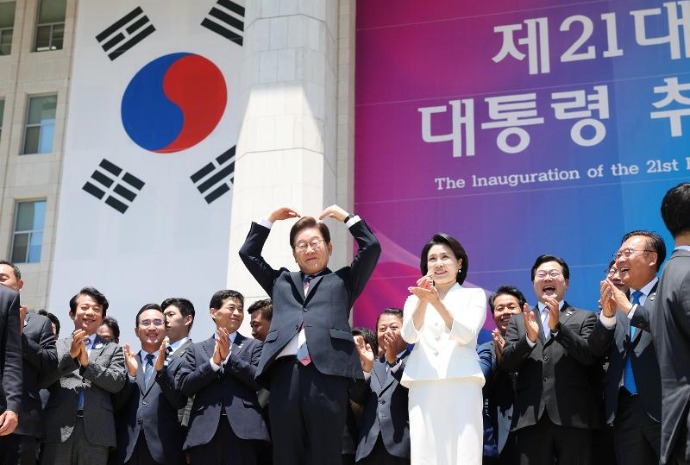
President Park Geun-hye (center) listens to speeches from participating leaders at the East Asia Summit (EAS) in Vientiane, Laos, on Sept. 8. President Park emphasized the unity of the international community in the face of the North Korean nuclear weapons program.
President Park Geun-hye, currently on a state visit to Laos, spoke at the East Asia Summit (EAS) on Sept. 8 to warn the world about North Korean nuclear weapons.
“If the world fails to recognize the urgency and seriousness of Pyongyang’s nuclear and missile threats, and if we don't shatter the North's drive to continue with its programs, the entire international community will regret it,” said President Park.
Leaders from 18 EAS participating nations, including President Park, adopted a statement on non-proliferation at the summit, which took place at the National Convention Center (NCC) in Vientiane. Regarding the statement, President Park said, “The adoption of this statement is significant as it displayed the EAS member states’ will to forcibly deal with Pyongyang’s continuing nuclear weapons threats.”
“North Korea’s provocations are existential threats for South Korea, as its weapons can reach all of our nation, including Seoul, located within a few kilometers of the border,” said the president.
“We need to complement U.N. Security Council resolutions if there are weak points in its full implementation, and build an environment with more defined pressures on North Korea, so that it has no choice but to change,” she said.
“Earlier this year, North Korea carried out its fourth nuclear weapons test and fired a total of 22 ballistic missiles at 14 launches. This is far more than the regime of former leader Kim Jong-il during his 18-year rule,” she noted.
“North Korea has been threatening that it will directly attack South Korea with nuclear weapons, and it is gearing up its development of submarine-launched ballistic missiles (SLBM) and intercontinental ballistic missiles (ICBM),” said President Park, stressing the risks posed by a North Korean regime with Kim Jong-un as its leader.
“Within just four or five minutes, North Korea’s nuclear weapons and missiles could reach all parts of the Republic of Korea,” she said.
“For this reason, we decided to take an inevitable, minimal and self-defensive measure,” said President Park, explaining to EAS leaders the inevitableness of Seoul’s decision to deploy the Terminal High Altitude Area Defense system (THAAD).
However, President Park did not directly mention the word “THAAD” directly, in consideration of the fact that both Chinese Premier Li Keqiang and Russian Prime Minister Dmitry Medvedev were present at the meeting.
President Park said, “The clear source of the problem is North Korea’s nuclear weapons and missile threats. The international community needs to focus all of its capacity on resolving this issue,” while repeatedly persuading Beijing and Moscow, as both those governments have doubts whether or not Korea's deployment of THAAD is part of a missile defense system controlled by the U.S.
Premier Li Keqiang reaffirmed Beijing’s stance, saying, “China supports denuclearization, peace and prosperity on the Korean Peninsula, and will fully implement U.N. sanctions against North Korea.”
Prime Minister Dmitry Medvedev also expressed Russia’s will to never accept North Korean nuclear weapons.

President Park Geun-hye (second from left) poses for a group photo with other world leaders at the East Asia Summit in Vientiane, Laos, on Sept. 8. The EAS adopted a joint declaration on the Regional Comprehensive Economic Partnership (RCEP) and urged North Korea to immediately give up its nuclear weapons and missile programs.
By Wi Tack-whan, Yoon Sojung
Korea.net Staff Writers
Photos: Cheong Wa Dae
whan23@korea.kr
